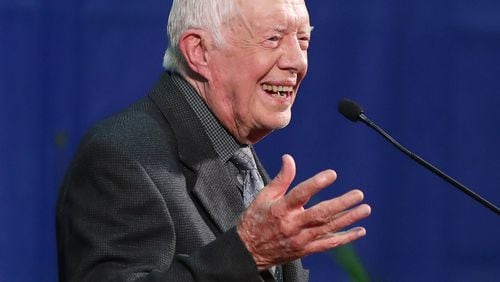The state of American politics is at “one of its all-time lows,” Jimmy Carter said Wednesday evening, adding that only the Civil War era may have been worse and more divisive in the country’s history.
"I think this has been the worst election season we've seen," Carter said during his 35th annual Town Hall Meeting with first-year students at Emory University. "But we have to remember our country is resilient. Throughout our history, we have always had the ability to make mistakes, like slavery, segregation and failure to give women the right to vote. And we've always been able to correct them."
Some 1,300 students who’d packed the bleachers at the Woodruff P.E. Center gave a standing ovation to the former president as he ambled in to “Hail to the Chief” — then proceeded to pepper him with questions about everything from the “most entertaining” technological change he’d witnessed in his lifetime (answer: television) to the amount of sleep he got as president (a solid six hours a night).
Many of the questions dealt with politics, though, and Carter didn’t pull his punches. He took aim at the Citizens United ruling — “The most stupid decision the Supreme Court has ever made,” he said to a huge cheer — congressional gridlock and dishonest politicians.
“I would like very much to see presidents sometime in the future or candidates tell the truth,” Carter said, who made clear he wasn’t singling out either one of the current candidates for the Oval Office.
Though he left little doubt who he and pretty much everyone who shares his DNA would be voting for.
“In my family we have 22 voters, direct descendants of me and (his wife) Rosalynn,” Carter said with a grin. “In the 2008 presidential campaign Obama got 22 votes out of 22. I would guess that this time Hillary Clinton will get 22 votes from the Carter family.”
The annual town hall has become a beloved autumn tradition at Emory, where the former president has served as University Distinguished Professor since soon after leaving the White House. The event isn’t open to the public and the questions are written out ahead of time and placed in a large metal drum and selected at random, game show-style. Throw in the fact that Wednesday night’s queries all came from students — primarily freshmen — who were young enough to be Carter’s grandchildren (or his children's grandchildren) and it all added up to a refreshingly candid and somewhat unpredictable affair.
Or as Carter quipped at the beginning of the hourlong session:
“Now, with a great deal of hesitancy and trepidation, I will answer the questions you have proposed to me.”
He didn’t get anything he couldn’t handle. To a question about the high cost of college, Carter suggested that the interest rate on student loans be dropped to the prime rate — “maybe 1 or 2 percent.” To one about which of the world’s “multitude of challenges” he’d advise the students’ generation to address, the Nobel Peace Prize winner spoke grippingly about “the most serious human rights violation on earth now and that is discrimination against women and girls.”
For all the seriousness of exchanges like that, the mood in the brightly lit gym felt somewhat lighter than last year’s town hall gathering. At that time, it had only been a month since Carter had discussed his brain melanoma diagnosis during a remarkably open and revealing press conference.
Since then, Carter's cancer has gone into remission and he's kept up a remarkable pace of activities — especially for a man who'll turn 92 on Oct. 1.
Three weeks ago, he and his wife, Rosalynn, spent five days in Memphis helping to build houses with Habitat for Humanity .
On Tuesday night, the spouses of 70 years had headlined “A Conversation with the Carters,” an annual public event held at the Carter Center. Before launching into a discussion of recent Carter Center activities and initiatives, the former president disclosed that he’d had his regular three-month checkup earlier that day and emerged with a good report.
An MRI of his brain “turned out to be OK,” Carter said. “They can still see the scars on the brain (from the earlier tumors), but they’re not getting any bigger, so that’s good.”
And on Wednesday night, he tried to rally the entire gym full of students to aim high in their own lives.
“The college age is when you’re most blessed with freedom and liberty at any time in your life,” Carter said. “If you decide to, you can set ideals for yourself that are quite wonderful.”
About the Author



/cloudfront-us-east-1.images.arcpublishing.com/ajc/P7DYBH6TO7FEKG4SUXQQKADRXE.jpg)



